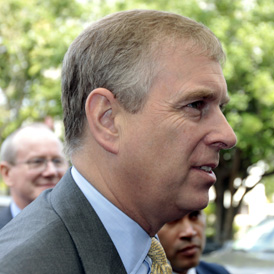Kazakh connections of the Duke of York
With the Duke of York facing pressure to step down from his trade ambassador role, Channel 4 News looks at his controversial connections to the regime in Kazakhstan.

Kazakhstan, the country which is perhaps more well known for being lampooned by British comedian Sacha Baron-Cohen’s Borat, is very fortunate in having significant natural wealth. The country has enormous fossil fuel reserves of oil and gas as well as sizeable amounts of copper, zinc and uranium. Since independence from the former Soviet Union, it was also the first republic to achieve an investment grade credit rating, boosting its status as a trading partner.
The Duke has helped British oil and gas companies in their operations in Kazakhstan Buckingham Palace
In his role as a trade ambassador for UK Trade and Investment (UKTI), the Duke of York has taken an interest in promoting trade between the UK and Kazakhstan to the extent that in 2010, a former Kazakh minister announced that the Duke had pledged to help the country boost trade and improve its image in the wake of of Baron-Cohen’s Borat film.
The Duke of York’s Kazakh connections have raised eyebrows however, especially his associations with the family of authoritarian President Nursultan Nazarbayev. Much financial power and influence is concentrated in the hands of Mr Nazarbayev and his family making the state a de facto oligarchy. The Kazakh regime also has connections to Iran.
President Nazarbayev has been in charge of the country since he was elected more than twenty years ago. Although he reportedly enjoys support from ordinary Kazakhs, democratic freedoms such as an open media are not present – most is state owned – and it is an offence to criticise the head of state.
The Economist ranked Kazakhstan 132 in its 2010 democracy index.
Royal connections
In 2007 President Nazarbayev’s son-in-law, Timur Kulibayev, is believed to have bought the Duke of York’s former home Sunninghill Park near Ascot, through companies he controls. Rumours circulated that Kulibayev paid more than £3m over the asking price for a property that had languished on the market for some time. The deal was carried out privately via the Royal household and the Queen’s solicitors.
The Duke has also been photographed with the Kazakh socialite Goga Ashkenazi, a one-time partner of Mr Kulibayev, whom he introduced to his mother, the Queen.
Goga Ashkenazi revealed in an interview with the Evening Standard newspaper that he had contacted her over the weekend saying in a BlackBerry message he was “very very worried” about whether he could remain in his role. She said she had told him not to worry and that the stories were being blown out of proportion.
“He knows it was unwise to fraternise with this Epstein character, and it was silly to be photographed with his arm around Epstein’s masseuse,” she added.
“But I know Andrew as a lovely, lovely man – kind-hearted, impeccably behaved and honourable – and I’m quite sure that at the time he had no idea that she was underage or anything more than a masseuse to Epstein.”
Re-branding
The extent to which the Duke has been able to carry out his pledge to help boost trade between Kazakhstan and the UK is difficult to establish conclusively. Although he has made several trips to the country as a trade ambassador, promoting links between the two states, the Duke’s office confirmed to Channel 4 News that his pledge has produced benefit to trade between the UK and Kazakhstan. But it denied that he was acting solely in the interests of another nation.
“A Buckingham Palace spokesman said: “The Duke has been able to identify opportunities for UK companies in the insurance and education sectors and has also helped British oil and gas companies in their operations in Kazakhstan.
“The Duke met the head of the Kazakh Sovereign Wealth Fund on an official visit, planned at the request of government.
“He was asked in this meeting to identify British businesses who might want to expand into Kazakhstan, a country with which UKTI works closely. This is absolutely core business for the Special Representative – finding opportunities for British companies the world over, and in doing so it is incorrect to suggest he is working for Kazakhstan, he is working entirely for the UK.”
Trade boost
However, trade between the two countries has seen an increase in recent times. A Parliamentary answer in spring 2010 revealed that recorded UK exports of goods to Kazakhstan in 2009 were worth about £260 million, compared with £209 million in 2008. UK imports of goods from Kazakhstan in 2009 were worth about £174 million, compared with £112 million in 2008.